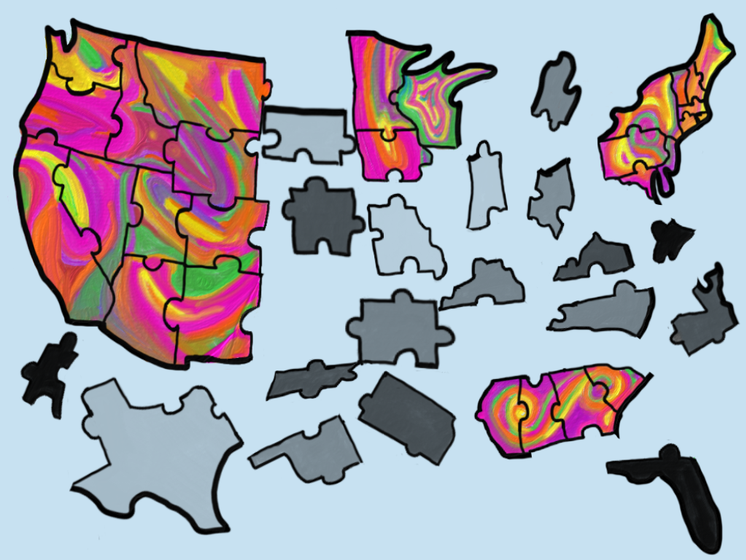{shortcode-c5478aa487dda3cf0b1e81d880aae8f02e133c9e}
As the United States approaches the fiftieth anniversary of President Richard Nixon’s declaration of a “war on drugs,” the country faces a reckoning over its long history of racism and institutional violence. That reckoning has manifested most publicly in protests this summer. But a crucial, if less visible, part of the fight for racial justice are efforts to decriminalize controlled substances — including psychedelics — that have played a large part in enabling the mass incarceration of Black, Latinx, and Indigenous Americans.
On Election Day, voters in Oregon voted to legalize psilocybin, the active ingredient in “magic mushrooms,” while voters in Washington D.C. voted to decriminalize their use.
This ballot que: Could the legalization of psychedelic drugs help to unify and “save” America?
In a panel on Oct. 28, Harvard Law School’s Petrie-Flom Center sought to interrogate this very question.
The panel — titled “Can Psychedelics Help Save America?” — was conducted over Zoom and included a variety of questions posed by both moderator Mason Marks and the panel’s viewers. Some of the discussion was rooted in the history of drug prohibition in the United States, but most of the conversation was future-focused, considering the pros, cons, and logistics of psychedelic legalization.
Panelists noted that legalizing psychedelics will decrease incarceration rates and reduce the stigma associated with psychedelic use.
Part of the reason psychedelics have been made illegal, panelist Dustin Martin argues, is not because they are unsafe to use, but rather because they “make us question the nature of reality.” This questioning poses a threat to those in power, he claims
While many spiritually-inclined people appreciate the way that psychedelics allow them to explore consciousness, the panelists rejected the argument that there are viable legal grounds to legalize psychedelics on the basis of religious freedom. A legal test case would require “a plaintiff to consider psychedelics a sacrament,” rather than merely use them casually, Martin explains. He also mentions that, while the Native American Church made this case and was approved to use Peyote, it would be extremely difficult to achieve widespread legalization in this manner.
Much of the available information about the nature of psychedelic drugs comes from Indigenous communities, who have been using them for centuries. But the United States’ troubled history with Indigenous peoples calls into question whether the country can move forward and benefit from these substances while also making sure to protect and respect long-standing Indigenous practices.
Panelists say it is imperative that we look to Indigenous communities for guidance. For example, many Indigenous leaders request that Peyote use be excluded from current ballot initiatives, as the plant is endangered and has long been a sacred part of Native American Church ceremonies.
Although the criminalized nature of psychedelic drugs has limited the possibility of collecting useful scientific data on them, most panelists agree that there is enough anecdotal and survey data to suggest the safety of psychedelic use among most individuals. When compared to other controlled substances, psychedelics are relatively safe to use; they are non-addictive and it is not possible for users to overdose and die.
According to panelist Larissa J. Maier,, of the 40,000 people who have taken an online survey she has administered since 2014, almost all have reported being happier after they had used psychedelics for the first time. Panelist Ifetayo Harvey stressed, however, that psychedelics aren’t necessarily for everyone — despite a widespread conception in the psychedelic community that they are. For example, people who are suicidal, are taking certain medications, or who have particular physical ailments, would not necessarily benefit from psychedelic use.
That said, the panelists emphasized the importance of widespread education regarding psychedelic use and harm reduction practices given the possibility of legalization. Maier mentions, for instance, that it is not recommended to combine psychedelics with other drugs, such as marijuana or alcohol, and that heroic doses should be approached with additional caution. Factors to consider are the durations of use and the importance of the location of the trip.
Still, the question remains: Can psychedelics really save America? All of the panelists believe that, in some way, yes — they actually can. Psychedelic legalization could decrease incarceration rates of low-income Black, Indigenous, and Latinx people imprisoned for controlled substance violations, and those suffering from mental health ailments could have a new form of treatment. But reaping those potential benefits might not be such a simple feat for this ever-divided country.
— Staff writer Nicole B. Farina can be reached at nicole.farina@thecrimson.com. Follow her on Twitter @nicolefarinaa.


